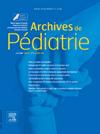Predictors of emotional eating behaviors in adolescents with overweight and obesity
IF 1.3
4区 医学
Q3 PEDIATRICS
引用次数: 0
Abstract
Purpose
Mood symptoms and disordered eating behaviors are common in adolescents with overweight and obesity. This study aimed to investigate the relationships between mood symptoms, difficulties in emotion regulation, and emotional eating behaviors in adolescents with overweight and obesity.
Methods
In this cross-sectional study, adolescents with normal weight (N = 45), overweight (N = 45), or obesity (N = 55) were assessed using semi-structured clinical interviews and self-report scales. Path analysis was used to examine factors contributing to emotional eating behaviors, considering psychiatric comorbidities, mood symptoms, emotional/binge/restrictive eating behaviors, difficulties in emotion regulation, and self-esteem.
Results
Adolescents with overweight and obesity exhibited more depressive, anxiety, and anger symptoms; restrictive, emotional, and external eating behaviors; and psychopathologies such as mood disorders, anxiety disorders, and attention-deficit/hyperactivity disorder (ADHD) compared with normal-weight adolescents. ADHD diagnosis, difficulties in emotion regulation, hypomanic/manic symptoms, and anger symptoms directly predicted emotional eating behavior, while self-esteem was an indirect predictor.
Conclusion
Adolescents with overweight and obesity tend to exhibit similar psychological characteristics, including increased mood symptoms and maladaptive eating behaviors associated with higher rates of anxiety and mood disorders, compared with their normal-weight peers. The most significant predictors of emotional eating behaviors were ADHD and difficulties in emotion regulation. Given the frequency of psychological comorbidities in obesity, their detection and management should be encouraged.
超重和肥胖青少年情绪化饮食行为的预测因素。
目的:在超重和肥胖的青少年中,情绪症状和饮食行为紊乱很常见。本研究旨在调查超重和肥胖青少年的情绪症状、情绪调节困难和情绪化饮食行为之间的关系:在这项横断面研究中,采用半结构化临床访谈和自我报告量表对体重正常(45 人)、超重(45 人)或肥胖(55 人)的青少年进行了评估。考虑到精神疾病合并症、情绪症状、情绪化/强迫性/限制性进食行为、情绪调节困难和自尊等因素,研究人员采用路径分析方法对导致情绪化进食行为的因素进行了研究:结果:与体重正常的青少年相比,超重和肥胖的青少年表现出更多的抑郁、焦虑和愤怒症状;限制性、情绪化和外食行为;以及情绪障碍、焦虑障碍和注意力缺陷/多动障碍(ADHD)等精神病症。多动症诊断、情绪调节困难、躁狂/狂躁症状和愤怒症状可直接预测情绪化饮食行为,而自尊则是间接预测因素:结论:与体重正常的同龄人相比,超重和肥胖的青少年往往表现出相似的心理特征,包括情绪症状和适应不良的饮食行为增多,焦虑症和情绪障碍的发病率较高。多动症(ADHD)和情绪调节困难是预测情绪性进食行为的最重要因素。鉴于肥胖症患者经常出现心理并发症,应鼓励对其进行检测和管理。
本文章由计算机程序翻译,如有差异,请以英文原文为准。
求助全文
约1分钟内获得全文
求助全文
来源期刊

Archives De Pediatrie
医学-小儿科
CiteScore
2.80
自引率
5.60%
发文量
106
审稿时长
24.1 weeks
期刊介绍:
Archives de Pédiatrie publishes in English original Research papers, Review articles, Short communications, Practice guidelines, Editorials and Letters in all fields relevant to pediatrics.
Eight issues of Archives de Pédiatrie are released annually, as well as supplementary and special editions to complete these regular issues.
All manuscripts submitted to the journal are subjected to peer review by international experts, and must:
Be written in excellent English, clear and easy to understand, precise and concise;
Bring new, interesting, valid information - and improve clinical care or guide future research;
Be solely the work of the author(s) stated;
Not have been previously published elsewhere and not be under consideration by another journal;
Be in accordance with the journal''s Guide for Authors'' instructions: manuscripts that fail to comply with these rules may be returned to the authors without being reviewed.
Under no circumstances does the journal guarantee publication before the editorial board makes its final decision.
Archives de Pédiatrie is the official publication of the French Society of Pediatrics.
 求助内容:
求助内容: 应助结果提醒方式:
应助结果提醒方式:


